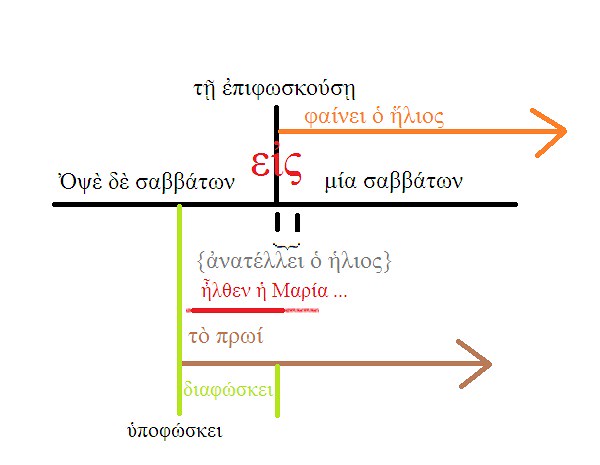I'm sorry. I didn't quote the verse under consideration. I was absorbed in the moment, and thought we were sitting together and talking and you could see what I could. I forgot that are on other sides of the internet.
Matthew 28:1 wrote:Ὀψὲ δὲ σαββάτων, τῇ ἐπιφωσκούσῃ εἰς μίαν σαββάτων, ἦλθεν Μαρία ἡ Μαγδαληνή, καὶ ἡ ἄλλη Μαρία, θεωρῆσαι τὸν τάφον.
Tim Evans wrote:Aren't you basically asking the same thing in the original post, but with "arrive" vs. "be on the way" instead of "come" and "go," respectively?
Perhaps I am, and perhaps not. Let me speak my mind more fully and you can decide for yourself.
With regard to the arrangement of time:
- ὀψέ is a long period of time, which fits somewhere at the end of the day.
τῇ ἐπιφωσκούσῃ is a dative bringing attention to a moment in time.
εἰς is a small context preposition, expressing a change, something like "They came/went into the room.", implying that they were in the hall, and after that they came/went through the doorway and changed rooms. The rays of sunshine came from the horizon and the Roman civil day began. Here, where there is no movement, but only a change of state, εἰς is very much like ἐγένετο.
μία σαββάτων is the (whole) first day of the week. (The first hour would be a form of πρώτη).
ἦλθεν is an action that is naturally long. The aorist doesn't seem to change that because ἤρχετο/ἤρχοντο are used sparingly and only in one of two specific senses.
Tim Evans wrote:if the greek is left ambiguous, (as in the text itself truly it is ambiguous), then the author or speaker would have been aware and comfortable with that ambiguity. If they wanted to make it less ambiguous, or it needed to be less ambiguous, then they could have been more specific.
It seems that the time reference markers are very specific, because there is a degree of redundancy in them. Let me draw them, and a few more:

(NB. τὸ πρωί as shown there is used in the context of the Jewish diurnal cycle, while ὀψέ is within the civil. That's why there is an apparent overlap.)
